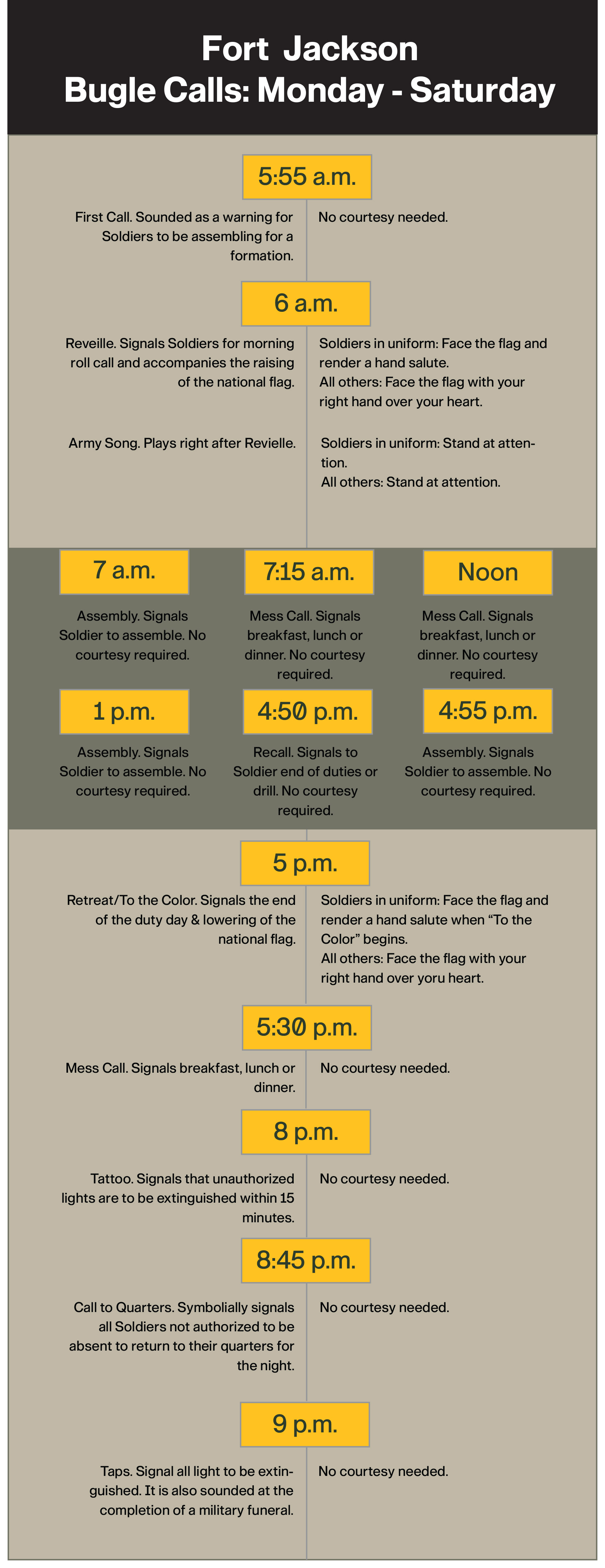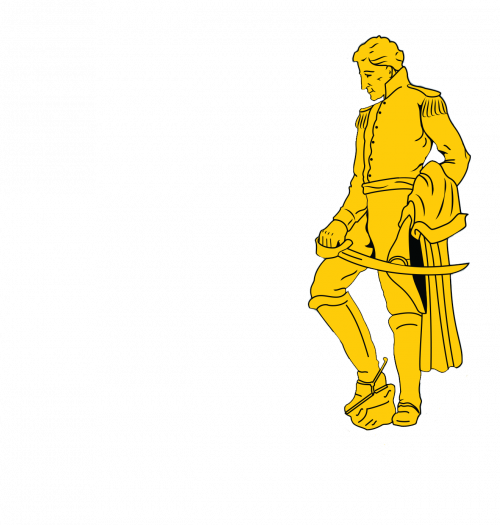Fort Jackson Bugle Calls

Reveille
If driving on post, please safely and slowly stop your vehicle when Reveille begins.
Soldiers in formation: Execute the commands of the officer or noncommissioned officer in charge.
Soldiers in uniform but not in formation: face the flag or direction of the music and render a hand salute until the last note of the music.
Civilians and Soldiers wearing civilian clothes: face the flag, come to the position of attention, remove headgear with right hand, and place right hand over the heart until the last note of music. Soldiers and veterans may render a hand salute rather than placing their hand over their heart.
Sunday/Holiday Bugle Call Schedule
|
7:55 a.m. |
First Call |
|
8 a.m. |
Reveille |
|
3:55 p.m. |
Assembly |
|
4 p.m. |
Retreat |
|
8 p.m. |
Tattoo |
|
8:45 p.m. |
Call to Quarters |
|
9 p.m. |
Taps |
Retreat/To the Colors
If driving on post, please safely and slowly stop your vehicle when Retreat begins.
Soldiers in formation: Execute the commands of the officer or noncommissioned officer in charge.
Soldiers in uniform but not in formation: face the flag or direction of the music. Stand at the position of attention until the firing of the cannon or the first note of "To the Color, then render a hand salute.
Civilians and Soldiers wearing civilian clothes: face the flag, come to the position of attention, remove headgear with right hand, and place right hand over the heart until the last note of music. Soldiers and veterans may render a hand salute rather than placing their hand over their heart.
History of Bugle Calls
Every evening at 1700, Soldiers, Family Members, and Civilian Employees can see, hear, and participate in a ritual that honors our nation, while continuing a tradition as old as the US Army. Cars stop, work pauses, games cease, while we render honors to the flag.
When George Washington first assumed command of the Continental Army in 1775, drums and bugles were already a fixture of military life. In a time before radios, there was simply no other way for a commander to communicate his orders amidst the din of firing muskets, clashing sabers, and booming cannons. For instance, work parties far from camp gathering forage for the horses knew to return to camp when they heard the call for “Retreat”.
In the frontier outposts of the late 1800’s, bugle calls united Soldiers and their Families. These small, lonely forts with garrisons of only one or two hundred Soldiers were often far from the nearest town. Household clocks were set by the bugle calls; one Army wife even used “Assembly” as the signal for the children to take their naps.
Days began early for Soldiers on the frontier, just as they do now. They began feeding and grooming horses before dawn, and following “Reveille” they had breakfast. Soldiers came together for inspection when they heard the call for “Assembly.” The Soldier with the best uniform and equipment was selected to be the commander’s orderly, which gave him bragging rights and (sometimes) the following day off.
After inspection, the Soldiers trained in critical skills that might still sound familiar to Dog Face Soldiers today: marching, bayonet fencing, marksmanship, and gen crew drills. “Mess Call” to lunch ended the morning training.
Soldiers spent most of the afternoon in fatigue details, such as chopping wood, maintaining the building and stables, and taking care of the horses. Soldiers returned from these tasks when the bugler sounded “Recall” giving the Soldiers time to prepare themselves for the evening parade and “Retreat”.
The day at most frontier outposts ended with a parade of the entire command around the central field. This was a way to inspect the discipline and equipment of the unit, but is was also a social community event attended by nearly all of the Family Members. Prior to the 1890’s Soldiers were required to assemble for a final roll call at 2200 for “Tattoo”, but this practice, along with inspections on Sunday, ended when the Army made its first great effort to improve the quality of Soldier’s lives.





